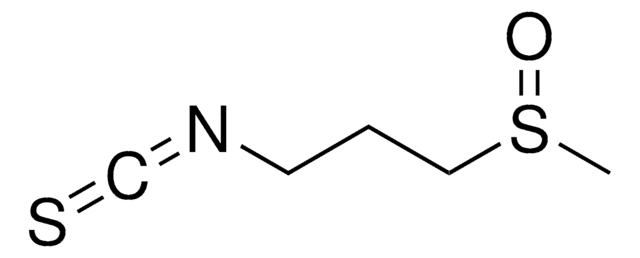SML3434
Erucin
≥98% (HPLC)
Synonym(s):
(4-Isothiocyanatobutyl)(methyl)sulfane; 4-(Methylthio)butyl isothiocyanate, 1-Isothiocyanato-4-(methylthio)butane, ERU, MTBITC
About This Item
Recommended Products
Quality Level
Assay
≥98% (HPLC)
form
oil
color
colorless to yellow
storage temp.
-10 to -25°C
SMILES string
CSCCCCN=C=S
InChI
1S/C6H11NS2/c1-9-5-3-2-4-7-6-8/h2-5H2,1H3
InChI key
IHQDGXUYTSZGOG-UHFFFAOYSA-N
Biochem/physiol Actions
Signal Word
Danger
Hazard Statements
Precautionary Statements
Hazard Classifications
Eye Dam. 1 - Skin Corr. 1B
Storage Class Code
8A - Combustible corrosive hazardous materials
WGK
WGK 3
Flash Point(F)
Not applicable
Flash Point(C)
Not applicable
Certificates of Analysis (COA)
Search for Certificates of Analysis (COA) by entering the products Lot/Batch Number. Lot and Batch Numbers can be found on a product’s label following the words ‘Lot’ or ‘Batch’.
Already Own This Product?
Find documentation for the products that you have recently purchased in the Document Library.
Our team of scientists has experience in all areas of research including Life Science, Material Science, Chemical Synthesis, Chromatography, Analytical and many others.
Contact Technical Service








